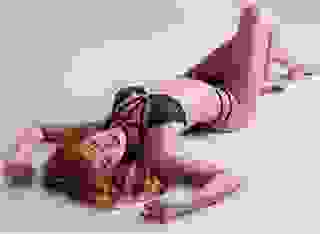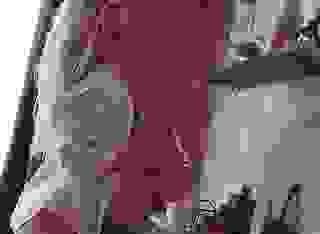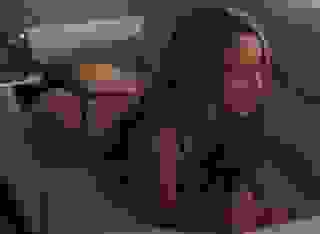- Non-Erotic
- For Three Transgressions...
Note: You can change font size, font face, and turn on dark mode by clicking the "A" icon tab in the Story Info Box.
You can temporarily switch back to a Classic Literotica® experience during our ongoing public Beta testing. Please consider leaving feedback on issues you experience or suggest improvements.
Click hereThough the overhanging black expanse of a new umbrella kept the pouring rain away from Amos Jefferson's head, it could not keep his face free of the saline moisture that had formed about his ebony eyes. As he stood silently, the gusting October wind began to whip the raindrops sidelong at the lower extremities of his pants. Tilting his umbrella to compensate, Amos noticed that the dribbles of rain on his mother's tombstone had formed a rivulet. Nearly an hour had passed at the grave site during this twelfth annual sojourn back to Little Rock, with Amos alternately weeping and talking aloud to his mother's memory. As he watched the swelling stream of water, his thoughts turned to the last time that he had seen her alive.
* * * * *
"You remember that time when you imagined that Talitha and little Kumi had gone off to fight in Iraq?" Amos queried his mother, Bonita Jefferson, about her two young grandchildren, his own niece and nephew, who had been mere tots during the time of her confusion. He gently massaged her right hand from the side of her North Little Rock Memorial hospital bed. Despite the residual impact of her recent stroke, Bonita snorted a hearty laugh of assent.
"You were in and out of reality for a long while back then. Who'd have thunk that a bladder infection could cause serious dementia like that?" Amos asked rhetorically. "Doctor Blevins said it poisoned your bloodstream, but it took 'em forever to figure that out." He watched his mother nod her recollection of the aftermath, though he knew that she had very few memories from the actual period of her dementia. Amos was thrilled to see that her long-term memory was still intact, notwithstanding the other obvious effects of her recent stroke. He tested the waters a little further.
"It was about that same time that you started comin' up with all that nonsense about your friends at the nursing home dyin' suspiciously." He watched her eyes for a glimmer of remembrance, but instead saw the twinkle of mirth disappear. "What? You don't remember that?" Bonita's eyes closed, though whether in response or simply in repose, Amos could not tell.
For the next half hour, Bonita drifted in and out of consciousness, finally awakening fully when one of the hospital's kitchen assistants delivered her dinner. Amos carefully and delicately spoon-fed her as he had done for each of her meals over the past several days. Because the stroke had made swallowing difficult for her, the main source of her nutrients was a protein-filled gelatinous dessert. As he was feeding her the gelatin, the shift nurse flounced into the room.
"How y'all doin' today?" she questioned cheerily.
"Pretty good, pretty good -- Momma's a tough ol' bird," Amos responded, "She even likes this loaded Jell-o."
"That's pretty potent stuff," quipped the nurse, "One of the kitchen staff sneaked that stuff for about six months and put on about sixty pounds!"
At that, Bonita's eyes lit up and she began to cackle with gusto. Amos could feel the bed quivering against his left knee.
Throughout the remainder of the evening, Amos continued to hold Bonita's hand as they reminisced together, laughed together, prayed together, and even sang together. Amos was amazed at the clarity of Bonita's articulation as she sang old hymns with him, especially given the slurring of her speech in normal conversation. He briefly stopped singing and simply listened, lost in the recollection of Bonita clad in a purple satin choir robe with yellow neckerchief, joyfully belting out praises from the platform of his childhood church. He fought back the tide of emotion that threatened to sweep him out to a sea of forlorn expectations. He knew that Bonita needed his strength now more than ever, but he knew that his strength alone was not sufficient.
As the time drew near for Amos to return to the airport, he drew out his Bible from his briefcase. With his mind on Bonita's difficulty with swallowing, Amos turned to the sixth chapter of the book of Matthew and began to read from the 25th verse: "For this reason I say to you, do not be anxious for your life, as to what you shall eat, or what you shall drink; nor for your body, as to what you shall put on. Is not life more than food, and the body than clothing? Look at the birds of the air, they do not sow, neither do they reap, nor gather into barns, and yet your heavenly Father feeds them. Are you not worth much more than they?" Amos felt a gentle squeeze from Bonita's hand, and observed a serene smile on her face.
"It's time for me to go, Momma," whispered Amos, his voice unable to find power. He managed a smile, and saw unrestrained love in her eyes as she beamed back at him. "I love you, Momma -- I'll see you at Thanksgiving." He leaned his cheek against her face, embracing her fondly before kissing her gently on the forehead. She squeezed his hand one more time and smiled from her eyes before he turned toward the door to leave.
* * * * *
"Your attention, please -- please direct your attention to the flight attendants at the front and midsections of the cabin as they direct you in our pre-flight safety instructions," the automated voice droned over the intercom. Amos roused from his restless slumber, but his attention was not drawn to the obligatory spectacle of seat-belt demonstrations. His mind instead wandered back to the same Little Rock to Washington flight after the days spent with his mother in the hospital twelve years earlier. That time, his worries had been directed toward Bonita's expected long road to recovery. Little had he realized that she would die suddenly and -- to him, at least -- unexpectedly, merely three days later, shortly after being transferred back to her Pine Bluff nursing home residence, just down the street from the apartment of his brother Hosea. Amos had been on the phone with his brother Joel, who lived in California, when the grim call from Hosea -- Talitha's and Kumi's father -- had interrupted on Joel's cell phone, announcing Bonita's demise. His airline tickets for a joyous return trip to Arkansas at Thanksgiving were converted into a heart-wrenching trip back for his mother's funeral.
Amos was no longer the aspiring young businessman that he had been when his mother had passed on. His career as an actuary had blossomed over the last several years. Regrettably, he had not had the satisfaction of seeing his mother's reaction when he had obtained his fellowship in the Society of Actuaries. An achievement in itself, the designation carried even more significance for Amos, an African-American who had been raised by his widowed mother in impoverished circumstances. Now -- the fall of 2022 -- he was in charge of an entire division in the Office of the Chief Actuary (OCACT) at the Social Security Administration (SSA). Amos felt that he should be at the peak of career satisfaction. Instead, his work seemed to carry little genuine significance. Somewhat daunted by the fact that he was now older than his late father had ever been, and troubled by the sense that he had no legacy of his own -- no wife, no children, no purpose -- he sometimes wondered if he should have followed in his father's footsteps as a Baptist minister. Thoughts of career alternatives meandered through his mind as Amos drifted back to sleep...
* * * * *
"I still have a dream..." Amos heard the booming baritone voice of Dr. Martin Luther King, Jr. resonating from the steps of the Lincoln Memorial in Washington, D.C., somewhere deep in his sleepy subconscious. Amos' father, Walter Jefferson, had participated in the March on Washington as an angry young teenager. As an adult, Walter had become a man of gentle persuasion, teaching Amos that anger reflected a perception of injustice, serving to warn us that we needed to fix the perception or fix the injustice. He had often spoken to Amos of the impact that Dr. King had had on his thinking from that historic late August day in 1963 onward. Walter -- like his icon -- had died all too young. Walter succumbed at age 41 to a massive heart attack, several years before Amos entered his own angry teen years.
The sweltering heat of Amos' dream was stifling, and he perspired profusely as he twisted in his reclined airplane seat. His subconscious rolled forward.
"I have a dream that one day this nation will rise up and live out the true meaning of its creed: 'We hold these truths to be self-evident: that all men are created equal.'"
With that cue, Amos' subconscious rocketed backward in American history. He found himself standing beside Thomas Jefferson, from whom Amos' own surname had been derived. In Amos' dream, Jefferson was oblivious to Amos' presence, despite his close proximity. Amos was surprised at the American forefather's delicate, porcelain-like facial features, contrasting with the square-jawed hero who has been portrayed on the front side of each American 5-cent piece minted from the days of the Buffalo Nickel forward. Amos moved behind Jefferson and peered over the patriot's shoulder. He watched him scrawl with his quill pen through a line in the third paragraph on the parchment page: "We hold these truths to be sacred and undeniable: that all men are created equal..." was replaced with "We hold these truths to be self-evident: that all men are created equal..." As Jefferson's scribbling of changes continued, Amos watched a still sacred theme emerge: "...that they are endowed by their Creator with certain unalienable Rights; that among these are Life, Liberty and the pursuit of Happiness..."
Amos' cranial motion picture careened further back in time. He found himself in ancient Israel, circa 750 B.C., in the city of Beth-El, listening to a bearded shepherd from Tekoa, a town further south in Judah. In his dream, Amos was inexplicably able to understand the Hebrew tongue spoken by the nomadic prophet who shared his first name:
"Thus says the LORD, 'For three transgressions of Tyre and for four, I will not revoke its punishment, because they delivered up an entire population to Edom, and did not remember the covenant of brotherhood...'"
"Thus says the LORD, 'For three transgressions of Edom and for four, I will not revoke its punishment, because he pursued his brother with the sword, while he stifled his compassion...'"
"Thus says the LORD, 'For three transgressions of the sons of Ammon and for four, I will not revoke its punishment, because they ripped open the pregnant women of Gilead in order to enlarge their borders...'"
"Thus says the LORD, 'For three transgressions of Israel and for four, I will not revoke its punishment, because they sell the righteous for money, and the needy for a pair of sandals...'"
"But let justice roll down like waters, and righteousness like an ever-flowing stream..."
* * * * *
At that moment, the plane lurched with turbulence. Amos, suddenly wide-eyed, found himself reaching for the airsick bag in the cloth flap behind the seat in front of him. He retched violently, not sure whether from the bumpy ride or the frightening scenes evoked by the prophet's vivid incantations near the tail end of his dream.
Able to regain his composure, amble to the restroom, dispose of the bag, and get a drink of water prior to buckling back in for the plane's landing, Amos weaved his way through his mental checklist of things to do upon arrival. His emotional and physical exhaustion argued for grabbing his bags and heading home to bed, but other allegiances warred for his attention.
Despite finding that his annual visits to Bonita's grave increasingly left him disconsolate about the meaning in his career and his life, Amos still took his job seriously. Though the hour was now late, he decided to drop in at his office at OCACT, which had been re-located to Washington from Baltimore several years earlier.
"Hey there, Amos -- you're back!" The genuine fondness that Sam, the night security guard, held for Amos was evident in his broad, neon grin. Amos returned the greeting as he approached the security desk and, after swiping his security card on the electronic reader, decided to invigorate his lethargic bones by climbing the stairs to his fourth floor office.
As he rounded a corner to the third floor landing, Amos was stunned to see the sprawling figure of Hugh MacKnight lying in a crumpled heap at the foot of the next set of concrete stairs. Amos clutched Hugh by his shoulders and shook him gently, trying to stir him to consciousness. Hugh's eyes opened, but could not seem to focus.
"Hugh, buddy -- it's me, Amos! What happened to you?"
"Compression... of... the... distribution..." muttered Hugh slowly, his thick Scottish brogue nowhere to be found.
"Hugh -- what're you talkin' about?" Amos pleaded. His eyes fixed on a cherry red, almost black, oozing wound near the crown of Hugh's burnished head. "Did you fall down the stairs?" Amos shuddered at the sheer stupidity of his question. There was no reply. Hugh's eyes closed once again.
"Hugh, listen to me -- we've gotta get you to a doctor. Lie still and let me call 911." Amos nearly swore as he fumbled the cell phone that he was extricating from his shirt pocket. After picking it up, Amos saw that there was no signal -- a common frustration caused by the thickness of the building's walls, but now looming as far more serious than the typical transient inconvenience.
"Crap," muttered Amos. "Hugh, I'm going to get help. Stay there 'til I get back."
Amos bounded down the stairs to find Sam and quickly explained the situation. While Sam issued the emergency call and waited to show the paramedics where they were needed, Amos raced back up the stairs to assist Hugh. He sat on the floor beside Hugh and cradled his friend's head on his inner elbow.
"Hang in there, buddy -- help's on the way," Amos offered, feeling helpless and unnerved.
Hugh's eyelids fluttered once more. "Help... them..." he whispered. Hugh's neck went limp.
"Hugh, buddy -- wake up!" Amos shouted desperately. He tried to administer CPR to Hugh, but it was to no avail. By the time the paramedics arrived, it was clear to Amos that his friend was dead. The official proclamation was made at the hospital a short time later.
* * * * *
Hugh had by no means been one of Amos' closest friends, but the two had worked together on several projects at OCACT and shared a certain sense of comfortable camaraderie. Hugh was a fellow actuary, though his credentials had been earned through a different professional body, the Faculty of Actuaries in Scotland, prior to his arrival in Washington. Amos had always enjoyed Hugh's sarcastic wit, as well as his heavy Edinburgh accent. Hugh had been responsible for performing numerous mortality studies over his years at OCACT. Amos found it disturbing that Hugh would so soon become one of those statistics.
In the weeks following Hugh's funeral, Amos found himself increasingly puzzled by the final phrases spoken by his late friend. "Compression... of... the... distribution..." ... "Help... them..." Amos also found himself haunted by recurrences of his dream about Dr. Martin Luther King, Jr., Thomas Jefferson, and the prophet Amos.
On a blustery Tuesday in late December, two days after a brown but frigid Christmas, Amos received an innocuous mass-distribution email notice from the Society of Actuaries. It solicited his nomination for the 2023 Robert J. Myers Service Award. While the rest of the world was enjoying a long holiday break with their families, Amos sat motionless behind his office desk, pondering the email's content. He reflected on whether the award had ever been made posthumously, and wondered whether Hugh would somehow qualify. "The award recognizes actuaries for a single noteworthy public service achievement and actuaries who have devoted their careers to public service," he read aloud. He knew from past history that there was a tendency to grant the award for lifetime service, but Hugh had been too young to qualify on that criterion. He probed his recollection of Hugh's body of work, but could not fathom a single crowning achievement on which he would otherwise qualify for the award.
Amos was roused from his musings by a rapid burst of knocks as his office doorknob turned. A silver-haired, bespectacled gentleman peered from behind the frosted glass of the door. Amos recognized the man as Henry Petersen, a paradoxical being if there ever was one, for he was both an actuary and a politician. Petersen's reputation had reached near-mythical proportions; he was known to be not only keenly intelligent, but also cunning and articulate.
"Jefferson, I need you to look into something for me," Petersen stated flatly. He appeared blatantly unaware of the lack of any direct reporting relationship or accountability channel between the two. Amos leaned forward, eager to hear Petersen's request, despite his inner resentment that Petersen's tone seemed to demand rather than to ask.
"I've been trying to justify to Congress why our 2022 OASDI Trustees Report still shows an under-funding problem," Petersen continued. "I don't think the assumptions have been updated sufficiently to reflect emerging experience. MacKnight was working on some new assumptions, but his untimely tumble has left me without the recommendation I need. You've got to make somebody available to assist me."
"Well, Congressman, we're all strapped for resources. Hugh didn't work in my division. Why do you want somebody from my staff?"
"Damn it, Jefferson, you're like so many of our fellow actuaries -- always identifying the problems rather than looking for solutions!"
"Look here, Congressman, I resent that remark," retorted Amos. "You, more than anybody, should know that when you're allocatin' scarce resources, you have to develop priorities. I'm just tryin' to figure out whether this belongs in the queue, and, if so, where it stacks up."
"Fine -- sorry, Jefferson," apologized Petersen, "but this is really important. It will affect next spring's Congressional budget in a significant way. Even minor changes to the assumptions could keep us from having to raise payroll taxes or cut Social Security benefits once again."
"I see," conceded Amos, "but I still don't know why you're comin' to me. Hugh's old department should already have a runnin' start on it."
"To be honest, I wasn't satisfied with their work thus far. 'Paralysis by analysis,' you know. I need this done, and I need it done yesterday. I already know what the assumptions should be -- I've seen the experience data. I just need somebody with authority to look over the proposed assumption changes and bless them."
Amos felt an involuntary shiver run up the length of his spine. Results-oriented judgments -- he'd heard about them from his lawyer friends, but he hadn't often heard them suggested by his actuarial peers, at least not in the public sector. "Tell you what, Congressman," he said, "I'll take a quick look at their files and see what I can do. But I want you to understand that I'm makin' no promises at this point."
"Thanks, Jefferson, that's all I can ask," replied Congressman Petersen. He withdrew from the room in as sudden a fashion as he had entered.
* * * * *
The early days of 2023 brought a pristine blanket of bright dust-like snow to the nation's capital. Amos pushed the fringed ends of his woolen scarf inside the neck of his heavy black trench coat. His frosty breath hovered in a mist about his face as he trudged westward along the Mall grounds. He always found a walk around the monuments to be productive at those times when he needed to engage in some heavy mental weight-lifting.
"Results-based assumptions," he thought. "That's what it sounded like when Petersen barged into my office. But that's not what the numbers bear out." He kicked a frozen wedge of snowy ice off the salted asphalt. "Hugh's mortality experience studies really do show that the cost of Social Security benefits is flattening out -- maybe even declining. But what was taking Hugh so long to recommend that the assumptions be updated to reflect that reality?"








